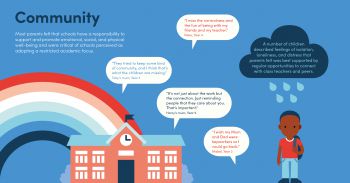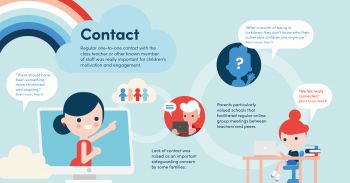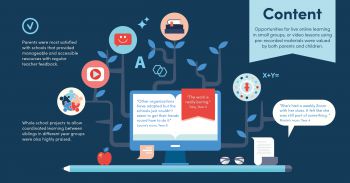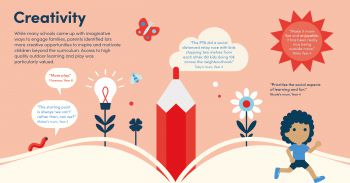
Communuty
 Contact
Contact
 Content
Content
 Creativity
Creativity
• Being connected to teachers and peers key to child well-being during school closures
• Great variability in school home learning provision during the 2020 lockdown
Psychologists who undertook a study into the home learning experience of families during school closures in the spring 2020 have published their guidance to schools planning home learning in response to the 2021 national lockdown. Following in-depth online interviews with parents and children in July and August 2020, Alison Lacey and Dr Kathryn Lester from the School of Psychology at the University of Sussex have identified four key areas for schools to focus home learning support in order to enhance the wellbeing of families during this new period of home schooling.
The study, which is one of the only to capture children's perspectives about the impact of school closures, included interviews with 21 families across Sussex and highlights a disparity in home learning provision, with schools taking markedly different approaches.
Alison Lacey, a doctoral researcher in developmental psychology at the University of Sussex comments: "What this study has highlighted is that the lack of guidance and support for schools during the first period of school closures in 2020 led to huge variability in provision. During these interviews we identified some key areas for schools to consider that could improve the experience for children and parents.
"The voices of young children have largely gone unheard in the political debate around Covid-19. It is essential that schools are supported by policy makers to implement consistent home learning provision that meets children's social and emotional needs as well as the academic learning needs of the children in their care."
Overall, the psychologists found that providing a sense of community through regular live online connection with teachers and peers was most highly valued by children and parents. Conversely, children who didn't have regular opportunities for engagement with their teachers and peers reported feeling isolated and lonely, trying to navigate home learning whilst their parents simultaneously worked from home.
"At school you get to talk to your friends - when you're doing work you get to talk to your friends so they can help you a bit, but at home my parents are working, my sister is doing her own thing, so I'm kind of like on my own." Evie, Year 6
The schools that provided access to manageable online resources with regular teacher feedback were praised by parents. Those that extended their offering beyond the purely academic are also positively mentioned, with opportunities for creative play in the outdoors important to many children.
Dr Kathryn Lester, Senior Lecturer in Developmental Psychology at the University of Sussex, says: "As we enter a second phase of school closures, we hope that this guidance provides a useful framework for primary schools at a national level to incorporate into their home learning strategies, and to inform policy makers about the needs and concerns of families with young children during periods of extended school closures."
For the study, 21 children in Years 3-6 and their parents were asked to describe the impact of school closures. In the first part of the interview, children were asked to describe their feelings about school closures including any thoughts about contact with family and friends, their experiences of home schooling, and feelings about returning to school in September 2020.
The parents were then asked about the impact on their child's mood and behaviour, to consider the positives and negatives of home learning, and to reflect on the impact of lockdown on family life more generally. Parents were also asked to evaluate the response of their child's school to the challenges of home learning.
Their findings have been broken down into a framework comprising four key areas: Contact,Content,Creativity and Community. Within these four areas the psychologists have identified examples of good practice as well as aspects of provision that could be changed or improved.






